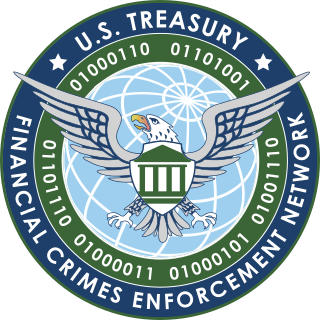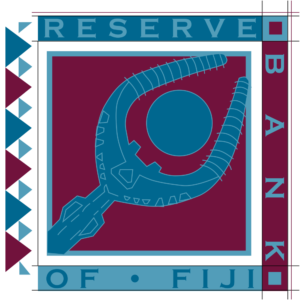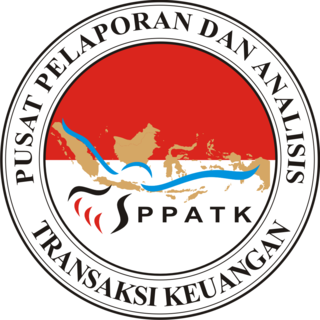Related Research Articles

Money laundering is the process of illegally concealing the origin of money, obtained from illicit activities such as drug trafficking, corruption, embezzlement or gambling, by converting it into a legitimate source. It is a crime in many jurisdictions with varying definitions. It is usually a key operation of organized crime.

The Financial Crimes Enforcement Network (FinCEN) is a bureau of the United States Department of the Treasury that collects and analyzes information about financial transactions in order to combat domestic and international money laundering, terrorist financing, and other financial crimes.
Structuring, also known as smurfing in banking jargon, is the practice of executing financial transactions such as making bank deposits in a specific pattern, calculated to avoid triggering financial institutions to file reports required by law, such as the United States' Bank Secrecy Act (BSA) and Internal Revenue Code section 6050I. Structuring may be done in the context of money laundering, fraud, and other financial crimes. Legal restrictions on structuring are concerned with limiting the size of domestic transactions for individuals.
In financial regulation, a Suspicious Activity Report (SAR) or Suspicious Transaction Report (STR) is a report made by a financial institution about suspicious or potentially suspicious activity as required under laws designed to counter money laundering, financing of terrorism and other financial crimes. The criteria to decide when a report must be made varies from country to country, but generally is any financial transaction that either a) does not make sense to the financial institution; b) is unusual for that particular client; or c) appears to be done only for the purpose of hiding or obfuscating another, separate transaction. The report is filed with that country's Financial Intelligence Unit, which is typically a specialist agency designed to collect and analyse transactions and then report these to relevant law enforcement teams.

Know Your Customer (KYC) guidelines and regulations in financial services require professionals to verify the identity, suitability, and risks involved with maintaining a business relationship with a customer. The procedures fit within the broader scope of anti-money laundering (AML) and counter terrorism financing (CTF) regulations.
Australian Transaction Reports and Analysis Centre (AUSTRAC) is an Australian government financial intelligence agency responsible for monitoring financial transactions to identify money laundering, organised crime, tax evasion, welfare fraud and terrorism financing. AUSTRAC was established in 1989 under the Financial Transaction Reports Act 1988. It implements in Australia the recommendations of the Financial Action Task Force on Money Laundering (FATF), which Australia joined in 1990.
Title V: Removing obstacles to investigating terrorism is the fifth of ten titles which comprise the USA PATRIOT Act, an anti-terrorism bill passed in the United States after the September 11, 2001 attacks. It contains 8 sections regarding the capture and prosecution of terrorists.

The Office of Intelligence and Analysis (OIA) is a component of the United States Department of the Treasury responsible for the receipt, analysis, collation, and dissemination of foreign intelligence and counterintelligence information related to the operation and responsibilities of the Treasury Department.

The Reserve Bank of Fiji is the central bank of the Pacific island country of Fiji. Its responsibilities include the issue of currency, control of the money supply, currency exchange, monetary stability, promotion of sound finances, and fostering economic development.
Terrorism financing is the provision of funds or providing financial support to individual terrorists or non-state actors.
The USA PATRIOT Act was passed by the United States Congress in 2001 as a response to the September 11 attacks in 2001. It has ten titles, with the third title written to prevent, detect, and prosecute international money laundering and the financing of terrorism.
The Financial Transactions and Reports Analysis Centre of Canada is the national financial intelligence agency of Canada. FINTRAC was established in 2000 under the Proceeds of Crime Act to facilitate detection and investigation of money laundering, FINTRAC's mandate was expanded in December 2001 following amendments to the Proceeds of Crime Act to also disclose financial intelligence to other Canadian intelligence and law enforcement agencies with respect to suspected terrorist financing. FINTRAC's mandate was further expanded in 2006 under Bill C-25 to enhance the client identification, record-keeping and reporting measures, established a registration regime for money services businesses and foreign exchange dealers, and created new offences for not registering.

The Egmont Group of Financial Intelligence Units is an international organization that facilitates cooperation and intelligence sharing between national financial intelligence units (FIUs) to investigate and prevent money laundering and terrorist financing. National FIUs collect information on suspicious or unusual financial activity and are responsible for processing and analyzing the information received. FIUs are normally not law enforcement agencies themselves, findings are shared with appropriate law enforcement or prosecution bodies if sufficient evidence of unlawful activity is found. The Egmont Group is headquartered in Ottawa, Ontario, Canada.
Financial intelligence (FININT) is the gathering of information about the financial affairs of entities of interest, to understand their nature and capabilities, and predict their intentions. Generally the term applies in the context of law enforcement and related activities. One of the main purposes of financial intelligence is to identify financial transactions that may involve tax evasion, money laundering or some other criminal activity. FININT may also be involved in identifying financing of criminal and terrorist organisations. Financial intelligence can be broken down into two main areas, collection and analysis. Collection is normally done by a government agency, known as a financial intelligence organisation or Financial Intelligence Unit (FIU). The agency will collect raw transactional information and Suspicious activity reports (SAR) usually provided by banks and other entities as part of regulatory requirements. Data may be shared with other countries through intergovernmental networks. Analysis, may consist of scrutinizing a large volume of transactional data using data mining or data-matching techniques to identify persons potentially engaged in a particular activity. SARs can also be scrutinized and linked with other data to try to identify specific activity.
Anti-money laundering (AML) software is software used in the finance and legal industries to help companies comply with the legal requirements for financial institutions and other regulated entities to prevent or report money laundering activities. AML software can facilitate faster and more accurate compliance and investigations.
A currency transaction tax is a tax placed on the use of currency for various types of transactions. The tax is associated with the financial sector and is a type of financial transaction tax, as opposed to a consumption tax paid by consumers, though the tax may be passed on by the financial institution to the customer.
The Garda National Economic Crime Bureau – informally known as the Fraud Squad – is a specialised division of Ireland's national police force, the Garda Síochána, that investigates economic crimes. The Bureau operates as part of the Garda Special Crime Operations branch and works alongside other sections of the force, as well as the external Office of the Director of Corporate Enforcement (ODCE), an agency tasked with investigating white-collar crime. The Economic Crime Bureau is responsible for the investigation of serious financial fraud and corruption. It was established in April 1996 and is based at Harcourt Square, Dublin 2. The GNECB is headed by an officer of Detective Chief Superintendent rank, who reports to the Assistant Commissioner of Special Crime Operations.
The Qatar Financial Information Unit (QFIU) is a Qatari government regulatory agency responsible for financial intelligence efforts to combat money laundering and financing of terrorism. Like other national Financial Intelligence Units (FIU) around the world, it requires banks, investment companies, insurers and other financial institutions to report suspicious financial transactions. QFIU then analyzes the information and disseminates the relevant data to law enforcement authorities for further investigation and action.

The Indonesian Financial Transaction Reports and Analysis Center or INTRAC or PPATK is a government agency of Indonesia responsible for financial intelligence. The agency was formed in 2002 to counter suspected money laundering and provide information on terrorist financing.
Financial Intelligence Unit—India (FIU-IND) is an organisation under the Department of Revenue, Government of India which collects financial intelligence about offences under the Prevention of Money Laundering Act, 2002. It was set up in November 2004 and reports directly to the Economic Intelligence Council (EIC) headed by the Finance Minister.
References
- ↑ "Full text of the Financial Transaction Reporting Act of 2004" (PDF). Archived from the original (PDF) on 2011-07-20. Retrieved 2008-01-06.
